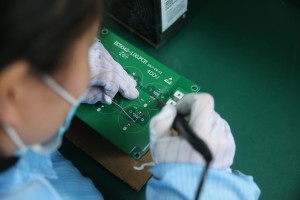Recently, Morgan Stanley Securities released the latest “Asia Pacific Automotive Semiconductor” report, saying that two major semiconductor manufacturers, Rexa and Ansome, have issued orders cutting, and are cutting chip test orders in the fourth quarter.
According to the report, the reasons for the order cutting issued by the big factory are as follows:
1、 TSMC’s output of vehicle semiconductor wafers in the third quarter increased by 82% annually, 140% higher than that before the epidemic;
2、 The weak sales of electric vehicles in mainland China (accounting for 50% to 60% of the global electric vehicles) has led to the full supply of vehicle semiconductors, and the trend of single cutting is beginning to occur.
Zhan Jiahong, an analyst of Morgan Stanley semiconductor industry, pointed out that according to the latest visit to the post foundry process of semiconductor wafers, some automotive semiconductors, such as MCU and CIS suppliers, including Rexa Electronics and Ansomy Semiconductor, are currently cutting some chip test orders in the fourth quarter, which shows that automotive chips are no longer out of stock.
Zhan Jiahong said that by comparing the revenue trend of global automotive semiconductors with the changes in automotive output, it can be found that in recent years, the CAGR of automotive semiconductors’ revenue is as high as 20%, while the automotive output is only 10%. From this trend, the oversupply of automotive semiconductors should have occurred at the end of 2020 and the beginning of 2021. However, affected by the spread of the global COVID-19 at that time, transportation was not smooth or even supply was cut off, resulting in an extreme shortage of automotive chips and continued shortage.
At the moment, as the impact of transportation is gradually easing, coupled with TSMC’s substantial increase in the output of automotive chips in the third quarter, and the weakening of market demand in Chinese Mainland, which accounts for 50% to 60% of the global sales of electric vehicles, automotive chips have been produced in full at present, and the chip shortage problem that has plagued the automotive industry for many years may be coming to an end.
As we all know, the structural shortage of chips has not improved since this year. The demand for consumer electronics is sluggish, and the supply of automotive chips falls short of demand. Major automotive chip manufacturers such as Texas Instruments, Italy France Semiconductor, Infineon and NXP have all released strong signals of growth in automotive chips.
Infineon, the leading manufacturer of automotive power semiconductors, has a conservative expectation of the shortage of automotive chips in the near future. Peter Schiefer, the global president of ATV of its automotive electronics business unit, said that the order trend of ATV is still strong, and some products are overbooked. For example, due to the shortage of CMOS production capacity of the OEM, the supply and demand of Infineon’s automotive MCU in 2023 cannot return to a balanced state. Stellantis, the global automobile manufacturer that has obtained the long-term reserved capacity of Infineon Power Semiconductor, also said in October that it is expected that the semiconductor supply chain will remain tense until the end of next year.
At the beginning of November, NXP, a large automotive chip manufacturer, said when releasing its Q3 financial report that because the revenue from automotive chips accounted for a large proportion, NXP avoided the dilemma of rapid decline in semiconductor demand. Like manufacturers in the automotive end market, NXP said that there is still a shortage of some products here. Investors are now concerned about how long the automotive end market can provide a buffer under the widespread drop in demand.
Not long ago, according to the research of Haina International Group, the chip delivery time in October was shortened by 6 days, which is the largest drop since 2016, further proving that chip demand is declining rapidly. However, Hainer also pointed out that the delivery time of Texas Instruments, which has a large product portfolio and customer list, was shortened by 25 days in October, and its supply of some automotive chips is still limited. It can be seen that even though the shortage of the global chip industry is being alleviated, some of its automotive chips are still in short supply.
But now, Morgan Stanley has released a new market signal, which may indicate that the core shortage and price rise environment that has plagued the automotive industry for a long time will be alleviated, and the new cycle of the semiconductor industry will come to an end.
——————Quoted from 变频器世界 Translated by EACON inverter
Post time: Nov-25-2022



